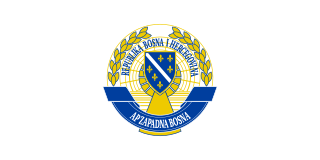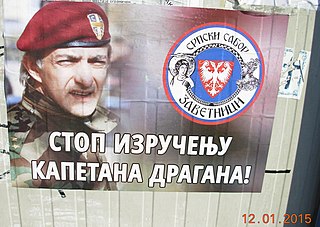
The International Criminal Tribunal for the former Yugoslavia (ICTY) was a body of the United Nations that was established to prosecute the war crimes that had been committed during the Yugoslav Wars and to try their perpetrators. The tribunal was an ad hoc court located in The Hague, Netherlands.

The Yugoslav Wars were a series of separate but related ethnic conflicts, wars of independence, and insurgencies that took place from 1991 to 2001 in what had been the Socialist Federal Republic of Yugoslavia. The conflicts both led up to and resulted from the breakup of Yugoslavia, which began in mid-1991, into six independent countries matching the six entities known as republics that had previously constituted Yugoslavia: Slovenia, Croatia, Bosnia and Herzegovina, Montenegro, Serbia, and Macedonia. SFR Yugoslavia's constituent republics declared independence due to unresolved tensions between ethnic minorities in the new countries, which fueled the wars. While most of the conflicts ended through peace accords that involved full international recognition of new states, they resulted in a massive number of deaths as well as severe economic damage to the region.

The Republic of Serbian Krajina or Serb Republic of Krajina, known as the Serbian Krajina or simply Krajina, was a self-proclaimed Serb proto-state, a territory within the newly independent Republic of Croatia, which it defied, and which was active during the Croatian War of Independence (1991–95). It was not recognized internationally. The name Krajina ("Frontier") was adopted from the historical Military Frontier of the Habsburg monarchy (Austria-Hungary), which had a substantial Serb population and existed up to the late 19th century. The RSK government waged a war for ethnic Serb independence from Croatia and unification with the Federal Republic of Yugoslavia and Republika Srpska.

The Bosnian War was an international armed conflict that took place in Bosnia and Herzegovina between 1992 and 1995. The war is commonly seen as having started on 6 April 1992, following several earlier violent incidents. It ended on 14 December 1995 when the Dayton Accords were signed. The main belligerents were the forces of the Republic of Bosnia and Herzegovina, the Republic of Herzeg-Bosnia, and the Republika Srpska, the latter two entities being proto-states led and supplied by Croatia and Serbia, respectively.

The Autonomous Province of Western Bosnia, was a small unrecognized proto-state that existed in the northwest of Bosnia and Herzegovina between 1993 and 1995. It consisted mainly of the town of Velika Kladuša, its capital, as well as a few nearby villages and fields. It was proclaimed as a result of secessionist politics by Fikret Abdić against the central government of Alija Izetbegović during the Bosnian War. For a short time in 1995, it was known as the Republic of Western Bosnia.

Dragan Vasiljković, nicknamed Captain Dragan is a convicted war criminal and former commander of a Serb paramilitary unit called the Kninjas during the Yugoslav Wars. In 2005, prosecutors in Croatia accused him of committing war crimes during the wars. A warrant for his arrest was subsequently issued by Interpol.

The Croatian War of Independence was an armed conflict fought from 1991 to 1995 between Croat forces loyal to the Government of Croatia — which had declared independence from the Socialist Federal Republic of Yugoslavia (SFRY) — and the Serb-controlled Yugoslav People's Army (JNA) and local Serb forces, with the JNA ending its combat operations in Croatia by 1992.

Manjača was a concentration camp which was located on mount Manjača near the city of Banja Luka in northern Bosnia and Herzegovina during the Bosnian War and the Croatian War of Independence from 1991 to 1995. The camp was founded by the Yugoslav People's Army (JNA) and authorities of the Republika Srpska (RS) and was used to collect and confine thousands of male prisoners of Bosniak and Croat nationalities.
Zoran is a common South Slavic name, the masculine form of Zora, which means dawn, daybreak. The name is especially common in Serbia, North Macedonia, Croatia and to some degree in Slovenia.

Joint criminal enterprise (JCE) is a legal doctrine used during war crimes tribunals to allow the prosecution of members of a group for the actions of the group. This doctrine considers each member of an organized group individually responsible for crimes committed by group within the common plan or purpose. It arose through the application of the idea of common purpose and has been applied by the International Criminal Tribunal for the former Yugoslavia (ICTY) to prosecute political and military leaders for mass war crimes, including genocide, committed during the Yugoslav Wars 1991–1999.

Radovan Karadžić is a Bosnian Serb politician who was convicted of genocide, crimes against humanity and war crimes by the International Criminal Tribunal for the former Yugoslavia (ICTY). He was the president of Republika Srpska during the Bosnian War.
Duško is a Slavic masculine given name, often a diminutive for Dušan.
The Trusina massacre occurred on 16 April 1993 in the village of Trusina, located in the municipality of Konjic in Bosnia and Herzegovina, where 22 people, four Croat prisoners of war and 18 Croat civilians, were killed by the Army of the Republic of Bosnia and Herzegovina (ARBiH) during the Croat–Bosniak War.

Slobodan Milošević was a Yugoslav and Serbian politician who was the President of Serbia between 1989–1997 and President of the Federal Republic of Yugoslavia from 1997 until his оverthrow in 2000. Milošević played a major role in the Yugoslav Wars and became the first sitting head of state charged with war crimes.
Ljubo is a South Slavic masculine given name. Notable people with the name include:
Radovan is a Slavic male given name, derived from the passive adjective radovati ("rejoice"), itself from root rad- meaning "care, joy". It is found in Serbia, North Macedonia, Bosnia and Herzegovina, Croatia, Montenegro, Czech Republic, Slovakia, Russia, Ukraine, and Bulgaria. It has been recorded in Serbia since the High Middle Ages.
Croatian war crimes in World War II may refer to:
Butcher of the Balkans is a sobriquet that has been used for the following individuals who committed war crimes and other atrocities in the Balkans.
Serbo-Croatian, Croato-Serbian, Serbo-Croat or Croato-Serb, refers to a South Slavic language that is the primary language of Serbia, Croatia, Bosnia and Herzegovina, and Montenegro, as well as a minority language in Kosovo.
Denial of the genocide of Serbs in the Independent State of Croatia (NDH), a Nazi German puppet state which existed during World War II, is a historical negationist claim that no systematic mass crimes or genocide against Serbs took place in the NDH, as well as an attempt to minimize the scale and severity of genocide.










